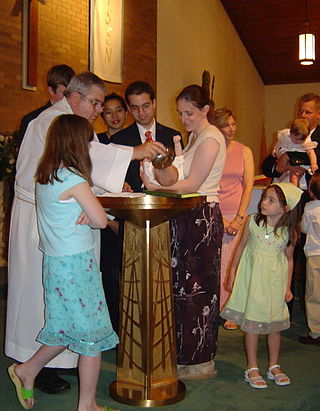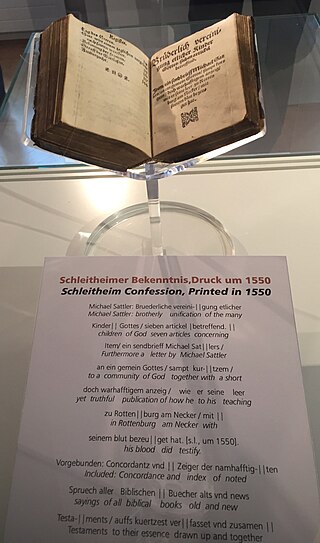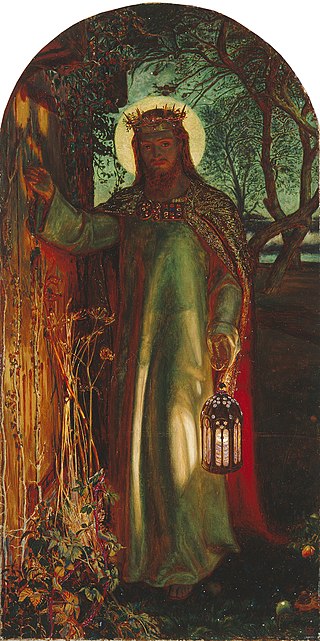Related Research Articles
Born again, or to experience the new birth, is a phrase, particularly in evangelicalism, that refers to a "spiritual rebirth", or a regeneration of the human spirit. In contrast to one's physical birth, being "born again" is distinctly and separately caused by the operation of the Holy Spirit, and it is not caused by baptism in water. It is a core doctrine of the denominations of the Anabaptist, Moravian, Methodist, Baptist, Plymouth Brethren and Pentecostal Churches along with all other evangelical Christian denominations. All of these Churches strongly believe Jesus's words in the Gospels: "You must be born again before you can see, or enter, the Kingdom of Heaven." Their doctrines also mandate that to be both "born again" and "saved", one must have a personal and intimate relationship with Jesus Christ.

Infant baptism is the practice of baptising infants or young children. Infant baptism is also called christening by some faith traditions.
Justificatio sola fide, meaning justification by faith alone, is a soteriological doctrine in Christian theology commonly held to distinguish the Lutheran and Reformed traditions of Protestantism, among others, from the Catholic, Eastern Orthodox, Oriental Orthodox and Assyrian churches. The doctrine asserts that it is on the basis of faith that believers are made right of their transgressions of the law of God rather than on the basis of what Paul calls "works of the law", sometimes called good works. This forgiveness is known as "justification". In classical Lutheran and Reformed theologies, works are seen as crucial evidence of faith, but the works themselves do not determine salvation. In contrast, Methodist doctrine affirms a belief in justification by faith that offers God's forgiveness, but holds that holy living with the goal of Christian perfection (sanctification) is essential for salvation.

The Westminster Confession of Faith is a Reformed confession of faith. Drawn up by the 1646 Westminster Assembly as part of the Westminster Standards to be a confession of the Church of England, it became and remains the "subordinate standard" of doctrine in the Church of Scotland and has been influential within Presbyterian churches worldwide.

In Christianity, salvation is the "saving [of] human beings from sin and its consequences, which include death and separation from God" by Christ's death and resurrection, and the justification following this salvation.

In Christian theology, justification is the event or process by which sinners are made or declared to be righteous in the sight of God.

Anabaptist theology, also known as Anabaptist doctrine, is a theological tradition reflecting the doctrine of the Anabaptist Churches. The major branches of Anabaptist Christianity agree on core doctrines but have nuances in practice. While the adherence to doctrine is important in Anabaptist Christianity, living righteously is stressed to a greater degree.
Sanctification literally means "to set apart for special use or purpose", that is, to make holy or sacred. Therefore, sanctification refers to the state or process of being set apart, i.e. "made holy", as a vessel, full of the Holy Spirit of God. The concept of sanctification is widespread among religions, including Judaism and especially Christianity. The term can be used to refer to objects which are set apart for special purposes, but the most common use within Christian theology is in reference to the change brought about by God in a believer, begun at the point of salvation and continuing throughout the life of the believer. Many forms of Christianity believe that this process will only be completed in Heaven, but some believe that complete holiness is possible in this life.
Christian perfection is the name given to theological concepts within some sects of Christianity that purport to describe a process of achieving spiritual maturity or perfection. The ultimate goal of this process is union with God characterized by pure love of God and other people as well as personal holiness or sanctification. Various terms have been used to describe the concept, such as entire sanctification, perfect love, the baptism with the Holy Spirit, the indwelling of the Holy Spirit, baptism by fire, the second blessing, and the second work of grace.

Imputed righteousness is a concept in Christian theology proposing that the "righteousness of Christ...is imputed to [believers]—that is, treated as if it were theirs through faith." It is on the basis of Jesus' righteousness that God accepts humans. This acceptance is also referred to as justification.

Eucharistic theology is a branch of Christian theology which treats doctrines concerning the Holy Eucharist, also commonly known as the Lord's Supper. It exists exclusively in Christianity and related religions, as others generally do not contain a Eucharistic ceremony.

The Confession of Faith of the Evangelical United Brethren Church is one of five established Doctrinal Standards of the United Methodist Church, along with the Articles of Religion, the General Rules of United Societies, the Standard Sermons of John Wesley, and John Wesley's Explanatory Notes on the New Testament. The United Methodist Church adopted the Confession of Faith in 1968 when the Methodist Church merged with the Evangelical United Brethren Church to form the United Methodist Church. The Confession of Faith covers much of the same ground as the Articles of Religion, but it is shorter and the language is more contemporary. The Confession of Faith also contains an article on the Judgment and Future State which had not been present in the Methodist Articles of Religion.

The Sinner's prayer is an evangelical Christian term referring to any prayer of repentance, prayed by individuals who feel sin in their lives and have the desire to form or renew a personal relationship with God through Jesus Christ. It is a popular prayer in evangelical circles. It is not intended as liturgical like a creed or a confiteor said or chanted within the Catholic Mass, but rather, is intended to be an act of initial conversion to Christianity; at the same time, it is roughly analogous to the Catholic Act of Contrition, though the theology behind each is markedly different, due to the intrinsically different views of salvation between Catholicism and Protestantism. While some Christians see reciting the sinner's prayer as the moment defining one's salvation, others see it as a beginning step of one's lifelong faith journey.
The Statement of Faith of the United Church of Christ is a Christian confession of faith written in 1959 to express the common faith of the newly founded United Church of Christ, formed in 1957 by the union of the Evangelical and Reformed Church with the Congregational Christian Churches. The statement was prepared by a 28-member commission elected at the Uniting General Synod in 1957 and was formally ratified by the Second General Synod in 1959. The commission, chaired by Elmer J. F. Arndt and vice-chaired by Douglas Horton, had equal representation from the two predecessor bodies, and included six women.
The Divine Service is a title given to the Eucharistic liturgy as used in the various Lutheran churches. It has its roots in the Pre-Tridentine Mass as revised by Martin Luther in his Formula missae of 1523 and his Deutsche Messe of 1526. It was further developed through the Kirchenordnungen of the sixteenth and seventeenth centuries that followed in Luther's tradition.

Thanksgiving after Communion is a spiritual practice among Christians who believe in the Real Presence of Jesus Christ in the Communion bread, maintaining themselves in prayer for some time to thank God and especially listening in their hearts for guidance from their Divine guest. This practice was and is highly recommended by saints, theologians, and Doctors of the Church.
Good Friday Prayer can refer to any of the prayers prayed by Christians on Good Friday, the Friday before Easter, or to all such prayers collectively.

Wesleyan theology, otherwise known as Wesleyan–Arminian theology, or Methodist theology, is a theological tradition in Protestant Christianity based upon the ministry of the 18th-century evangelical reformer brothers John Wesley and Charles Wesley. More broadly it refers to the theological system inferred from the various sermons, theological treatises, letters, journals, diaries, hymns, and other spiritual writings of the Wesleys and their contemporary coadjutors such as John William Fletcher.
Repentance is a stage in Christian salvation where the believer acknowledges and turns away from sin. As a distinct stage in the ordo salutis its position is disputed, with some theological traditions arguing it occurs prior to faith and the Reformed theological tradition arguing it occurs after faith. In Catholic theology, Lutheran theology, Orthodox theology and Anglican theology, repentance plays a key role in Confession and Absolution.
While both rhema and logos are translated into the English word, in the original Greek there was a substantial distinction. The use of the term rhema has special significance in some Christian groups, especially those advocating the Five-Fold Ministry that God gave of five gifts or callings to some people. Christians denominations that advocate the Five-Fold Ministry include Charismatic Christianity, the Pentecostal Movement, the Apostolic-Prophetic Movement and the Word of Faith Movement.
References
- ↑ "The Brief Statement of Faith". www.presbyterianmission.org. Archived from the original on 2012-07-28. Retrieved 2016-02-07.